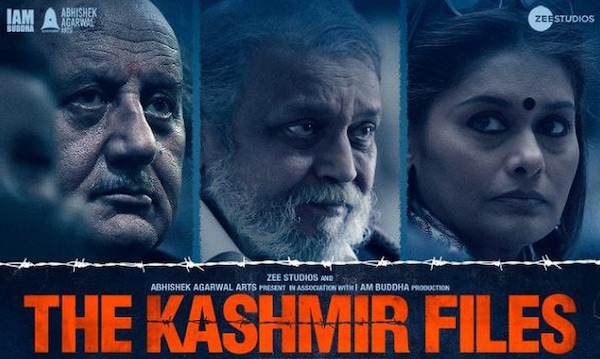The Kashmir Files review: They try too hard to show you the horrors of an unheard part of a war
The subject is important, and yet you cannot put a finger on why this movie tries too hard to show you the horrors instead of touching your heart.

The Kashmir Files (via Instagram)
Last Updated: 03.26 PM, Mar 10, 2022
Story:
Krishna Pandit is a young man who comes to Kashmir to scatter his grandfather’s ashes and learn about his family’s past. His grandfather’s friends slowly reveal the pain and the suffering that Kashmiri Pandits faced when they were forced out of their homes. The ‘woke’ lad begins to understand his legacy.
Review:
Most of us don’t know what it is to lose our homes to people who want you to convert to another religion or die, or leave the state. We cannot even begin to fathom the agony of living like a refugee in our own country.
The film starts innocuously, with kids playing cricket in the snow in Kashmir. But when one of the kids chants Sachin Tendulkar’s name, he is beaten up by older kids who call him names. The lad and his friend escape and have to hide before they reach home because there are men with torches burning and looting the neighbourhood. The mob is chanting: Ralive! Tsaliv! Ya Galive!
You do feel a shiver down your spine when you realize they’re warning the Kashmiri Pandits to convert (to Islam), leave the state, or perish. You watch as the director shows brutal deaths of innocent people, but you are waiting for something to touch you. A neighbour snitching on a neighbour should shock you, but you’ve seen it already in a movie called Shikara where the Islamic militants don’t destroy a Hindu house because a Muslim neighbour covets the house.
Anupam Kher plays Pushkar Nath, who is a professor of philosophy who plays Shiva in a play for Mahashivratri. They’re doing a dress rehearsal when the militants kill his son and claim that they could have raped the daughter in law so there would be ‘one less kaafir’.
Anupam Kher and his daughter in law escape with two grandkids in a truck to Jammu. At the refugee camp there, the government's apathy towards the citizens is clear.
The narrative shifts from the past to the present so often that the film seems choppy. It is not ever made clear why Krishna is so disbelieving of his grandfather. Refugees do try to protect the children from the horrors of war, but stories are told and memories are retained because they are passed down from generation to generation. If the Jews told the horrors of war to their children, Sindhis did the same when they were forced to leave their homes. And Darshan Kumar does not come across as someone who is young enough to swallow propaganda spouted by his teacher (played by Pallavi Joshi with a gusto of a preacher). Had the actor been a teenager, we could have understood that he is vulnerable to radical influence by a persuasive teacher, and then when he learns the truth about the genocide in Kashmir we would understand if he were to change his mind again. Faiz's 'Hum Dekhenge' which was written when Zia Ul Haq took over Pakistan and promised to rule it under strict Islamic rules being used to show how universities are propagating the terrorist agenda seems to be so wrong. I wished there was a song for the loss and alienation in 'Chhod aaye hum wo galiyaan' from Gulzar's Maachis. Or the poetry of loss in Harud.
The constant shift from past to present also means seeing his grandfather’s friends' age too: Mithun Chakravarty (he plays an IAS officer), Puneet Issar (plays a cop), Prakash Belawadi (plays a doctor) and Atul Srivastava (plays a journalist). All four are carrying the guilt of seeing everything awful and not saying anything.
Movies like Maachis and Harud deal with the alienation of young men from civil society, show them become radicalised due to sheer frustration of the state of their lives. Here, though we hear Kashmiris wanting plebiscite, we never really understand why they want to become Pakistani. Who gave them that slogan and why is a question the film does not answer. They do say that the foreign press will not cover the ‘real Kashmir’, but what is that real Kashmir, is a question that is answered in a long propaganda-like monologue about how ‘Hindus were once great’ at the very end of the film.
When you watch the film you are touched by scenes of loss, but the graphic murder scenes feel overdone. Yes, the villain admits he shot 20 people, but do you have to show each one being shot at? And showing a woman being sawed into two, why? Also, the two men taken away by the militants and lynched was just out of some bad horror movie. All these horrible things may have happened, but did it need to be shown? It is awful to see there is no food, but watching Anupam Kher lick a biscuit to save it for later made me want to hit the invisible fast forward button.
Verdict:
When you realise that the film is attempting to show everything, you wish they had spent time on making you feel that loss, that pain of perhaps one or a few families. Even well-made documentaries can sucker punch you. This 170-minute long film feels like a hasty cram about a gigantic loss.
The subject is important, and yet you cannot put a finger on why this movie tries too hard to show you the horrors instead of touching your heart.
Author's Bio:
"Manisha Lakhe writes on film and tv shows, is a poet, teacher, traveller and mom (and not necessarily in that order). Could sell her soul for Pinot and a good cheesecake."

 Premium
Premium